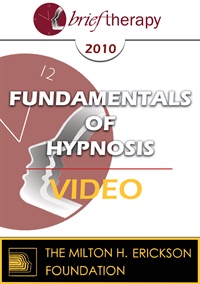- Average Rating:
- Not yet rated
- Topic Areas:
- Hypnosis | Fundamentals of Hypnosis | Neuroscience
- Categories:
- Brief Therapy Conference | Brief Therapy Conference 2010
- Faculty:
- Ernest Rossi, PhD
- Course Levels:
- Master Degree or Higher in Health-Related Field
- Duration:
- 2:43:01
- Format:
- Audio and Video
- Original Program Date:
- Dec 12, 2010
- Short Description:
- Revolutionary research in neuroscience documents how experiences of (1) Novelty, (2) Environment Enrichment, and (3) Mental & Physical Exercise can optimize gene expression, brain plasticity (brain growth), and mind-body healing. We will learn how to use our highest and most inspired states of consciousness to facilitate optimal gene expression and brain plasticity while healing stress and trauma.
- Price:
- $29.00 - Base Price
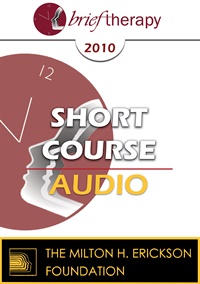
- Average Rating:
- Not yet rated
- Topic Areas:
- Neuroscience | Short Courses | Neurobiology | Brief Therapy | Mind-Body
- Categories:
- Brief Therapy Conference | Brief Therapy Conference 2010
- Faculty:
- Richard Hill, MBMSc, MEd, MA
- Duration:
- 1:30:17
- Format:
- Audio Only
- Original Program Date:
- Dec 09, 2010
- Short Description:
- Breakthroughs in neuroscience and neurophysiology explain how a mindset can alter what is turned on and turned off in the brain and the body. The work of Siegel, Rossi, Bandura, Aronson & Steele and Deci & Ryan act as pieces of a puzzle that explain why therapy can be disrupted by an imposed mindset and how this “winner/loser world” mindset is an unseen barrier to our more natural, creative, interpersonal process. A new, simple brief therapy is presented for lasting, transformational change.
- Price:
- $15.00 - Base Price
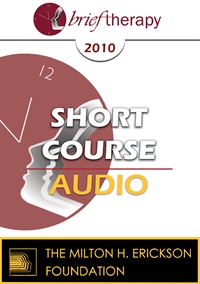
- Average Rating:
- Not yet rated
- Topic Areas:
- Couples Therapy | Short Courses | Gestalt | Intimacy | Relationships | Neurobiology | Neuroscience
- Categories:
- Brief Therapy Conference | Brief Therapy Conference 2010
- Faculty:
- Roberta Karant, PhD | Stefan Deutsch
- Duration:
- 1:33:35
- Format:
- Audio Only
- Original Program Date:
- Dec 09, 2010
- Short Description:
- Couples in distress minimize and numb their pain by avoiding contact. By writing a vision of what they both want, the therapist can focus the couple on the future. By combining Gestalt concepts with those popularized by Hendrix and others, therapists can have a powerful effect on quickening the healing process. New sessions will involve writing, note taking, and an agreed upon assignment to be practiced during the week. With Roberta Karant and Stefan Deutsch.
- Price:
- $15.00 - Base Price
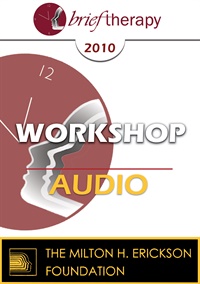
- Average Rating:
- Not yet rated
- Topic Areas:
- Attachment | Couples Therapy | Neuroscience | Workshops | Developmental Therapy Model | Differentiation
- Categories:
- Brief Therapy Conference | Brief Therapy Conference 2010
- Faculty:
- Ellyn Bader, PhD
- Duration:
- 1:54:30
- Format:
- Audio Only
- Original Program Date:
- Dec 12, 2010
- Short Description:
- Using a developmental lens is powerful to lead couples to make sustained change. Learn to use developmental principles to assess what is wrong and to direct your treatment decisions. Videotapes and clinical case examples will be used throughout the workshop to demonstrate how to promote development in hostile and conflict avoidant couples.
- Price:
- $15.00 - Base Price
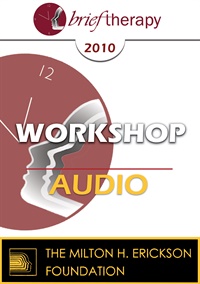
- Average Rating:
- Not yet rated
- Topic Areas:
- Hypnosis | Neuroscience | Psychotherapy | Workshops
- Categories:
- Brief Therapy Conference | Brief Therapy Conference 2010
- Faculty:
- Ernest Rossi, PhD
- Duration:
- 2:33:32
- Format:
- Audio Only
- Original Program Date:
- Dec 12, 2010
- Short Description:
- BT10 Workshop 38 - What Makes Us Human? The New Neuroscience of Therapeutic Hypnosis & Psychotherapy - Ernest Rossi, PhD Live demonstrations of “The Creative Psychosocial Genomic Healing Experience,” our new, easy-to-learn 20 minute protocol for facilitating the ideo-plastic faculty of therapeutic hypnosis & brief psychotherapy. Why bust your chops trying to make sense of the old, out-of-date Stanford and Harvard Hypnotic Susceptibility Scales that never were appropriate for optimizing “What makes us human?”
- Price:
- $15.00 - Base Price
Tags: Hypnosis Neuroscience
- Average Rating:
- Not yet rated
- Topic Areas:
- Addiction | Neuroscience | Keynotes
- Categories:
- Brief Therapy Conference | Brief Therapy Conference 2012
- Faculty:
- Patrick Carnes, PhD, CAS
- Duration:
- 1:07:07
- Format:
- Audio Only
- Original Program Date:
- Dec 08, 2012
- Short Description:
- BT12 Keynote 04 – Bargains with Chaos: Challenges and Choices – Patrick Carnes, PhD, CAS We witness a continuous parade of stars, financial gurus, clergy, politicians and athletes who enter rehabs sometimes repetitively. Is this about media coverage or are these elite canaries in the coal mines of our culture signifying a greater danger? Our understanding of addictions with the aid of neuroscience is expanding dramatically. With it is the realization of cultural and scientific shifts which underline the therapist’s role in facing our number one public health problem. One of the gifts of this challenge is our growth in technology which will transform what every therapist does for a living and maybe how humans evolve. But maybe we professionals are like the famous—reluctant to face difficult realities.
- Price:
- $15.00 - Base Price
Tags: Addiction Neuroscience
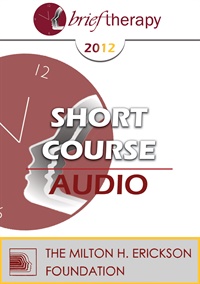
- Average Rating:
- Not yet rated
- Topic Areas:
- Trance | Neuroscience | Psychotherapy | Short Courses
- Categories:
- Brief Therapy Conference | Brief Therapy Conference 2012
- Faculty:
- Susan Pinco, PhD
- Duration:
- 1:13:42
- Format:
- Audio Only
- Original Program Date:
- Dec 09, 2012
- Short Description:
- BT12 Short Course 47 – Is it the Talking that Cures? An Exploration of the Role of Silence and Words in the Clinical Encounter – Susan Pinco, PhD Explore the role that silence plays in the hypnotic and clinical process. Our journey will begin with a discussion of structured and unstructured silence, how both are manifested, and potentially utilized. It continues with an overview of research related to silence in psychotherapy as well as findings in neuroscience that help explain why silence is a key ingredient in effective trance-formational processes. Attendees will engage in exercises that are designed to expand their awareness of the pivotal role that silence plays in healing and in so doing facilitate the conscious development of strategic interventions that utilize silence hypnotically to address a wide range of clinical issues.
- Price:
- $15.00 - Base Price
Tags: Neuroscience Psychotherapy Trance
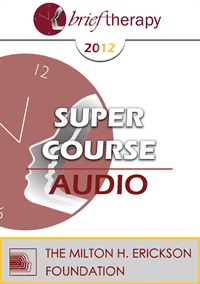
- Average Rating:
- Not yet rated
- Topic Areas:
- Attachment | Neuroscience | Super Courses | Intimacy | Differentiation
- Categories:
- Brief Therapy Conference | Brief Therapy Conference 2012
- Faculty:
- Ellyn Bader, PhD
- Duration:
- 1:51:57
- Format:
- Audio Only
- Original Program Date:
- Dec 09, 2012
- Short Description:
- BT12 Super Course 02 – Passion, Vitality and Intimacy: Integrating Attachment, Differentiation and Neuroscience – Ellyn Bader, PhD Many partners crave intimacy or demand it, yet they fear the involvement that makes intimacy possible. Learn to use attachment theory, differentiation theory and neuroscience principles to lead your couples out of pain. Create sustained change with challenging issues such as infidelity, ongoing hostility, narcissism and pervasive conflict avoidance. Videotapes and clinical case examples will be used throughout the workshop.
- Price:
- $15.00 - Base Price
Tags: Differentiation
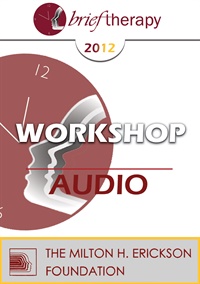
- Average Rating:
- Not yet rated
- Topic Areas:
- Neuroscience | Psychotherapy | Workshops
- Categories:
- Brief Therapy Conference | Brief Therapy Conference 2012
- Faculty:
- Ernest Rossi, PhD
- Duration:
- 2:42:36
- Format:
- Audio Only
- Original Program Date:
- Dec 06, 2012
- Short Description:
- BT12 Workshop 02 – Practicing the New Neuroscience of Psychotherapy – Ernest Rossi, PhD Group and individual demonstrations of Rossi’s new Activity-Dependent Approaches to the 4-stage creative process for optimizing of gene expression, brain plasticity, problem solving and mind-body healing. Practical approaches for all the psychotherapies as presented in Rossi’s 2012 book, Creating Consciousness: How Therapists can Facilitate Wonder, Wisdom, Beauty, and Truth.
- Price:
- $15.00 - Base Price
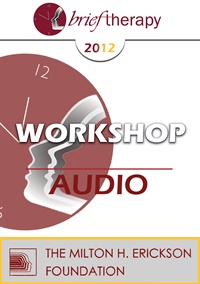
- Average Rating:
- Not yet rated
- Topic Areas:
- Consciousness | Neuroscience | Psychotherapy | Workshops | Four-Stage Creative Process | Self-Care | Therapist Development
- Categories:
- Brief Therapy Conference | Brief Therapy Conference 2012
- Faculty:
- Ernest Rossi, PhD
- Duration:
- 2:43:56
- Format:
- Audio Only
- Original Program Date:
- Dec 08, 2012
- Short Description:
- Neuroscience documents how experiences of (1) Novelty, (2) Environmental Enrichment, and (3) Mental & Physical Exercise can optimize gene expression, brain plasticity (brain growth), and mind-body healing. We will practice psychotherapy as discussed in my recent book Creating Consciousness: How Therapists can Facilitate Wonder, Wisdom, Beauty, and Truth.
- Price:
- $15.00 - Base Price
Please wait ...


